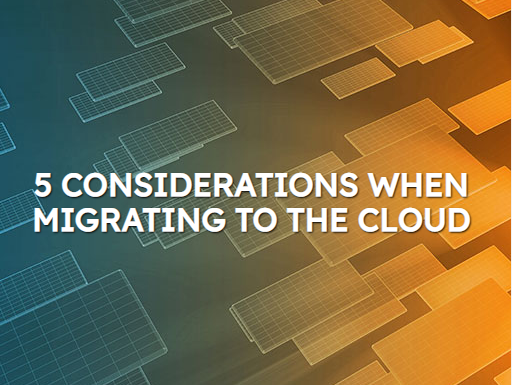5 Considerations When Migrating to the Cloud
May 15, 2020

Cloud has become so popular that the market is almost saturated. The 2019 State of the Cloud Report discovered that 94% of the companies surveyed use cloud and 84% of them have adopted a multi-cloud strategy that uses two or more clouds managed by multiple vendors.
Cloud migration can be a complex and risky process, whether a company is:
- Choosing cloud for the first time
- Moving assets from one cloud to another
- Migrating assets to the cloud in the journey toward digital transformation
Before undertaking a cloud migration, there are key considerations companies need to keep in mind to error-proof the process.
Here is an overview of 5 factors to think about before a cloud migration:
1) Type of Cloud Model
Before your company moves to the cloud, you need to decide which cloud model to use. Each model offers its own advantages and disadvantages, depending on business goals and the requirements of the workloads in question.
Private cloud is a good choice for companies with strict security and compliance standards. Access to sensitive data is easier to control in the private cloud. The public cloud is ideal for hosting customer-facing applications and archiving data.
Hybrid cloud offers both private and public cloud resources. These cloud environments are interoperable, allowing for more efficient backup and recovery as well as the ability to move applications between cloud environments.
2) Application Compatibility
Not all applications work well in a cloud environment. Applications should be tested to see if they are compatible with the cloud. If not, the migration may present an opportunity to upgrade a legacy application or convert it to an API.
It’s better to find out if an application is incompatible with the cloud before migration than after, when it might create a disruption. Continuing to run the application on-premises is always an option.
3) Risk of Data Loss
Moving a data center to a cloud infrastructure is risky business. Any time data gets moved, it can be lost, compromised, or even stolen by cybercriminals. Your company can prepare by backing up any data that will be part of the migration.
Organizations need to ensure that their security tools are in place and operable during the migration. Encryption, intrusion detection, and intrusion prevention systems can protect data while in transit and alert your company of any attempts at a breach during the move.
4) Planning a Strategy
Planning ahead for a cloud migration is essential to streamlining the process. A migration strategy will set a timeline, establish goals and stages in the process, and prevent the project from going over budget. Everyone involved in the migration should be aware of their role in it and what that role entails.
A migration strategy should also take into consideration how the move aligns with business goals. A company’s business strategy will determine which cloud services and models are part of the migration as well as which resources end up in the cloud.
5) Minimizing Downtime
During the migration process, company systems and applications will experience some amount of downtime. Even scheduled downtime can be costly for an organization because it impedes productivity. The best approach is to try to minimize downtime as much as possible.
Scheduling the migration process around employee schedules helps to lessen the impact of downtime. A migration can be accomplished in stages, moving certain resources when they are not needed. Temporary environments can also be set up to host and run applications during the migration.
Need Help Moving?
When you move into a new home, you choose either a professional mover or a group of trusted friends to help. Why? Moving is a big commitment, and you want all your assets to get to the new house in one piece. The same is true of migrating to the cloud. Choosing the right cloud migration partner is the key to success.
ProActive offers application migration services as part of our data center transformation services. We work closely with clients to evaluate their current environments and assess risk before migration. Our migration services help companies control costs, protect their assets, and solve interoperability problems for a worry-free cloud migration experience.
Looking for help planning and carrying out a cloud migration? Get a quote from ProActive for your next infrastructure project.
